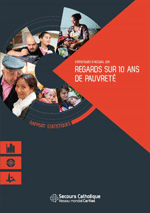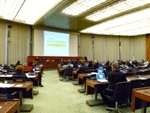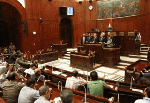Published on Thu, 2012-11-29 09:21
Women and immigrants living in France have been hit hardest in France by the global economic crisis, according to Secours Catholique. Women account for 57 percent of people seeking help from this member organization of the Social Watch network, almost 10 percent more than a decade ago. In the past decade, poverty in France, far from diminishing, has taken root. Getting out of the poverty trap is taking longer than ever before. |
Published on Tue, 2012-11-27 07:46
“The Bulgarian government continues the trends of sacrificing social and economic rights of the citizens with the justification of economic and financial stability, thus continuing to sustain the phenomenon of ‘stability in poverty’,” warned last week the Bulgarian Gender Research Foundation (BGRF, member of Social Watch since 1999) in its report to the UN Committee on Economic, Social and Cultural Rights. |
Published on Mon, 2012-11-26 08:10
The Council of the International Union for the Protection of New Varieties of Plants (UPOV) adopted this month new rules on the granting of observer status to its meetings that will restrict the participation of NGOs and farmer communities, especially their biggest and more important organization worldwide, La Via Campesina. The UPOV Convention has over the years been systematically changed to increasingly favor formal plant breeders, endowing them with rights that are far stronger than those of farmers, warned the Third World Network (TWN). |
Published on Mon, 2012-11-26 08:05
“It’s not just money that’s required for achieving the MDGs. Another reason why we are so behind with them is the Philippines’ warped development. Yes, there is economic growth, but it has been accompanied by greater inequality, unemployment, underemployment and environmental degradation,” wrote Jessica Cantos, Co-Convener of Social Watch Philippines, in a report published by New Internationalist, newspaper specialized on issues of world poverty and inequality. |
Published on Mon, 2012-11-26 08:03
The constitutional declaration issued by the Egyptian president Mohamed Morsi last week “contravened the revolution’s goals of democratization and exploited the expansive powers he granted to himself shortly after his election to arrogate unparalleled powers and immunize his decisions against judicial oversight,” warned 22 human rights organizations. |








